今年的大会主题是“学无边界”,13场跨界演讲,9大主题论坛,8个自由沙龙,5个工作坊,新的教育纪元开始了。
学校,老师,学生,这些角色的界限已经变得越来越模糊,一个个勇敢的声音让我们已经有越来越多的机会去真正地“释放”自己,去改变这个世界。
我们兴伟学院的学生和老师一起参加了这次大会,深有感悟。
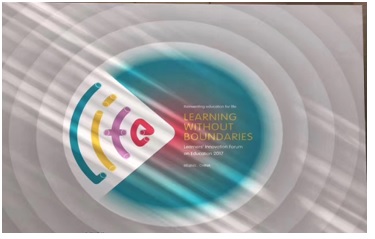
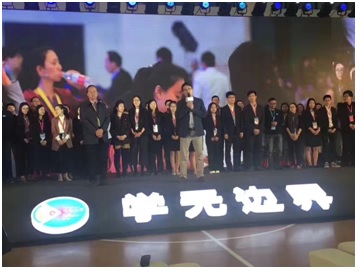
LIFE峰会 大会主题:学无边界
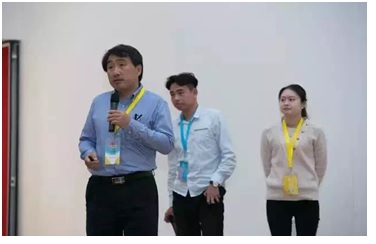
发言嘉宾:陈韦明(上海兴伟学院创办人)、郭少彬(在校生)、林婷婷(毕业生)
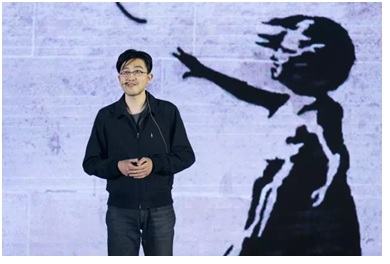
发言嘉宾:隋鑫 斜杠青年-不能用一个简单的职务职称来定义的年轻人
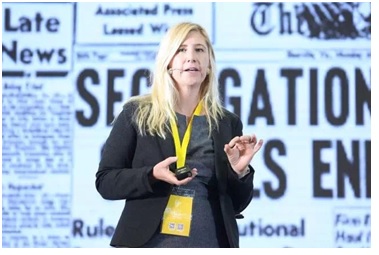
发言嘉宾:High Tech High 教育领导力学院院长
“比李斌老师更大胆的是上海兴伟学院的韦明校长,他把整个学校交给同学们去管理。他的演讲都让学生来替他讲,但是学生讲一句,抵上校长讲十句。这样的’懒‘校长再多几个,中国的教育就有希望了。”
这段话来自21世纪教育研究院公共平台,我相信这给予了我们兴伟学院很大的信心!
以下是我们的同学和老师对此次大会的感悟:
Durant 刘帅:
小时候以为天边有树围着的地方就是世界的镜头,路走的多了才知道这世界那么大。曾经是一片荒野的家乡西城区如今已经在城市化过程中变成了灯红酒绿的夜场,可能,很多人的精神故乡都是这样在城市扩张的过程中消失的,最后只能保留在记忆里。我想我应该是比较幸运的,至少在大学这段时间里,我的“故乡”一直都在。很多人曾经对新式教育的执念又何尝不是如此。满腔热血想大刀阔斧参与到教育改革中的热情在峥嵘岁月中被磨碎。
成长总是要不断失去,上大学近两年,看着昔日意气风发的偶像身陷囹吾,看到曾经口口声声说要为祖国人民谋福祉的人最后终究没能逃脱世俗的窠臼,看着许多自己曾经仰慕的人被世人不齿……或许从来一切都只是我的一厢情愿,正如红楼梦里说:眼看他建高楼,眼看他高楼起,眼看他……然而我还是愿意用我心中不多的善意来揣测你们,我相信你们一定有许多的不得已,无人倾听。我在想,是教育的失败还是人性的堕落?
第二届LIFE教育峰会,让我发现了许多勇敢的声音,来自不懈奋斗的实践者的声音。在短暂的两天时间里,来自祖国各地乃至世界的教育者们或是参与到教育中的人们畅所欲言,使我这样一个坐在台下的一个普通听众也脑海如电光石火般的闪过好些念头。比如说,连续创业者隋鑫在数千人面前不避讳地说自己的中学糗事。在我看来,他是抱着纯真信仰的一整代年轻人。他的“启蒙”或许正来自于那个年代对理想最热切、最激情的追求。当他说他对私人航天领域一无所知却仅因为热情而去找伙伴,找资源去做的那一刻,我就懂了。我的念头全部都在一瞬间闪现:让我听听他是怎么做的吧。他的声音略有一丝害羞感,零零落落的节奏,但是却给我一种无形的感染力。他想尽了一切办法接触到在私人航天领域上的工作者们,不论知名度,不论地域,更不论成功与否。他的故事化解了我心中的原有块垒,坐在台下的我开心的暗自笑了出来,多么美好的事。有时候,真的,演讲的最终目的,其实不在于讲,而在于听。
而另一个令我魂梦萦绕的是一所在美国加州的学校:High Tech High。为听众介绍这所学校的Laura女士把绝大多数的时间用来展示这所学校的学生上。其中有一位学生,从没接受过任何绘画训练,在不断的鼓励和支持下,他在这个以“项目式学习”的学校中画出了一只美丽的蝴蝶。而在刚开始的时候,他画出的“蝴蝶”真可谓是“四不像”。尊重和支持每一个学生的个性化发展,注重团队交流与合作,让教育回归到生活。这是许多西方国家早已在做,现在还在探究并坚持去做的事。在他们的世界观里,视学生的成功为教育的成功。
Schmidt在耶鲁大学学报是这样嘲笑中国大学的:它们把经济上的成功当成教育的成功,并竟然引以为骄傲,这是人类文明史上最大的笑话。这不仅是Schmidt 眼中中国大学的问题。事实上,中国人早已将“经济上的成功”视为“成功”的全部。在这个欲望贲张的年代,大学时刻面对两难选择——是随波逐流,还是保持独立?复旦大学校长杨玉良曾说过,大学的物理的围墙可以拆掉,“精神围墙”绝对不能折。因为没有了“精神围墙”,大学就无法满足人们对她高尚性和纯活性的期盼,就丧失了大学存在的价值。然而,中国大学的物理围墙正在加高加厚,而“精神围墙”却面临倒塌。大学在电视宣传片中吹嘘的是它的建筑物,而不是它的人文精神,学生选择大学,选择的标准不是一个大学的传统,而是就业率的高低。所以,为了考上一个好大学,高中生终日埋在课本与试卷的书堆之中。
在我看来,中国人有两个出身,一是家庭,一是大学。中国人对大学的执念,源于个人对身份的焦虑。当整个社会都认为读大学时成才标准,大学却不能提供社会需要的人才,是大学的失败;当孩子要提早告别童年的快乐,父母要牺牲全部积蓄,兄弟要放弃接受教育机会,才能让大学生读上一个找不着未来的大学,则是社会的变态——我们对大学失望,是因为期望过高;我们对它期望过高,只是因为成本昂贵。
大学要培养的应该是“健全”的精英,他需有自由独立的思想,天马行空的创意,逆流而上的意志,推动社会进步的精神,有着蓬勃的生命力。但今时今日,大学是官场、商场、名利场、欢场、广场、是盲目扩张的流水线、是潜规则当道的小社会、限制外来人员的私家园林、占地面积巨大的小城市,却唯独不是理想主义者心中的“大学”。
我们不必制造苦难,生活中的坎已足以让我们有时像毛虫一样作茧自缚,陷于一种生存的窒息状态,或是处于绝望的境地。如果我们能用心去咬破自己构筑的外壳,这一过程会很痛苦,但是对于教育的重生,它又是一种必须。
Nancy 毛灵吟
One of the things that struck me first was the sheer diversity and number of innovative educational communities that are springing up in all parts of China. Most of these schools and organizations have very similar missions and ways of achieving their goals. Many of them seem to inherit Dewey’s approach to education. For instance, they all touched upon the idea that the innate curiosity of children should be protected, the importance of reflection in learning from doing and the necessity of putting oneself into a place of discomfort if anything is to be learned and any innovation to be cultivated. In that sense, Xing Wei also belongs to this group of “outliers” in striving to offer a personalized, practical, skill based learning environment, in which the students are the ones who take the rein on their own education. I’ve also heard key phrases like “project-based learning” and “internet-powered teaching” tossed around from talk to talk. Perhaps, this is the new trend that the group of revolutionary and disruptive educators is following, as they cut against the grain.
There is one school in particular, which shares many commonalities with Xing Wei and could serve as a case study. It is called High Tech High based in San Diego, California. They advocate for a project-based learning. It was started as a one-room schoolhouse, with an aim to promote educational equality. The students are required to work in a farm and bring what they learn outside into the classroom, echoing the ideal of Deep Spring College. The school has a 10-person committee, which plans the curriculum and subjects taught in the classroom. At Xing Wei, we have EACC that oversees curriculum planning but also seven other committees responsible for various aspects of running the school. Many of the teachers at High Tech High are entrepreneurs, engineers, businessmen, architects, musicians, and writers who do not have a formal teacher training but come in with their rich experience working in different industries. Once they join up as teachers at High Tech High, they are trained in a teaching program on site for a month or two. The most important thing that they’re looking for in a teacher is passion for teaching and letting students learn in their own ways and pace. I think that is also what Xing Wei is seeking to do, bringing in experts from the society at large to interact with the students so that theory and practice, school and society, knowledge and hands-on learning, are not separated from one another. One of the things that I think Xing Wei could benefit from doing is organizing school exhibitions, journals or student-led conferences to give the students a chance to showcase what they’ve learned, worked on and thought about to a public audience. Presenting their work and ideas to an audience from outside the school might be nerve-wracking, but it adds another layer of significance to what they’ve accomplished in class, when the students have adults from the outside willing to take some time out of their busy lives, listening to them. Students could also improve their confidence and have a stronger sense of belonging when they’re carrying out field-work, working on projects, putting on exhibitions, publishing journals, organizing conferences together with their peers and advisors. Right now, the students at Xing Wei do not really have a sense of belonging and I think a tighter-knit community would create a more conducive learning environment.
By doing a project, it is not just the end result that should be examined, evaluated and commodified. The students ought to be transformed. The teachers ought to be transformed. And, the audience ought to be transformed. The speaker, Laura, gave an inspiring example of Austin’s butterfly and she said, “When a student has a moment of excellence, a moment they did something that they never thought could be done before, they are forever transformed.” At Xing Wei and at other places where teaching happens, I think the student’s transformative “moment of excellence” is what teachers should be working towards. The teachers should always be there for the student with a guiding hand but one that does not push excessively or unilaterally, not before the student is ready.
编辑:Ethel 吴淑怡
Durant 刘帅
Nancy 毛灵吟
图片来源:21世纪教育研究院公共平台


